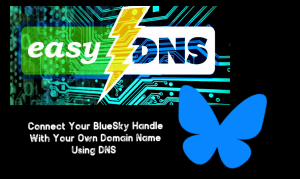There’s a lot of activity on BlueSky lately, one of the Twitter/X alternatives. Like Mastodon (another Twitter/X alternative, we’ve been following for awhile), your identifier is based on a hostname – which opens the door to integrating with it a custom domain via the DNS. A nice feature they have over there on BlueSky […]
What's New
CyberWeek at easyDNS: 20% Off Deals to Boost Your Hosting Game
CyberWeek has officially landed, and at easyDNS, we’re celebrating with a sale that’ll make your digital life a whole lot easier—and 20% more affordable. From today (Cyber Monday) to Sunday at midnight, you can enjoy a 20% discount on: Anycast DNS: DNS Standard, DNS Pro, and Enterprise. The discount will also apply to the DNS […]
URL Forwarding with “Drop Path” and “Drop Query String” options
By default, our URL forwarding and redirection always preserved the full pathname and query strings in all requests. It means that if you were forwarding: https://example.com to https://example.net Then all requests to the old URL that had path info or query strings, like: https://example.com/document/name?param=value Would have the /document/name?param=value preserved when forwarded: https://example.net/document/name?param=value But sometimes you […]
easyDNS now accepting Solana (SOL) payments
easyDNS is now accepting Solana (SOL) payments for all services, following on a theme of firsts: First ICANN accredited registrar to accept Bitcoin payments (back in 2013) We had Bitcoin treasury strategy long before anybody had ever heard of Microstrategy. First to accept ETH for payments and provide ENS linking to legacy domains, […]
The issuemail tag for CAA records is now supported
easyDNS has recently added support for the ‘issuemail’ tag in CAA (Certification Authority Authorization) DNS records. This new feature allows domain owners to specify which Certificate Authorities (CAs) are permitted to issue S/MIME (Secure/Multipurpose Internet Mail Extensions) certificates for email addresses associated with their domain. By implementing this tag, domain administrators gain greater control over […]
Les nouvelles politiques de messagerie électronique de Gmail, Yahoo, et autres nécessiteront des domaines activés pour DMARC
Mise à jour : 20 janv. 2024 : La date limite du 1er février ne concerne que les domaines expéditeurs qui envoient plus de 5 000 messages par jour vers Google. À partir du 1er février, Gmail et Yahoo commenceront à appliquer l’exigence de Domain-based Message Authentication, Reporting and Conformance (“DMARC”). DMARC est un protocole […]






